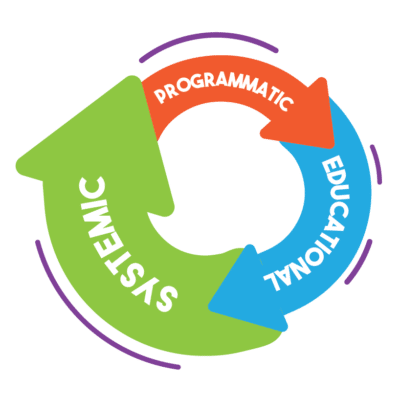In 2022, we’ve all been working to rebuild. As the year draws to a close, plenty of setbacks remain, particularly for the vital yet fragile early childhood workforce. At times, it can feel as though we’re falling backward even as we fight for every step forward.
Yet there have been some big wins, too, like New Mexico voting to make pre-K a universal right.
And the same is true for our work on early talk. Earlier this year, we released the results of two major analyses that independently showed children born during the pandemic vocalize less and experience fewer conversational turns than their counterparts born before the pandemic. It was a sobering finding, to say the least, and one we’ve been more deeply exploring and talking about since — in Discover, in Forbes, in Education Week, and on podcasts, among other places.
It’s clear from this data and other independent research that children have lost too many nourishing, rich, amazing interactions during the pandemic, but it’s equally clear there are many, many people working together to ensure this doesn’t become our long-term reality. We here at LENA have realized our responsibility, in part adapted from a framework from Bellwether Education Partners, to use our unprecedented data insights to build broader awareness and inform systemic changes in early childhood.
Together with our more than 500 partners worldwide, we’re building an ecosystem of early talk with our programs, with our educational reach, and our influence on systems. By year’s end, LENA technology will have measured 20 million conversational turns on 90,000 LENA Days, bringing back, measurably, some of what was lost. But that’s only part of the story, and it’s where we go from there that we’re focusing on now.
Programmatic Reach: More and more children are benefitting from LENA programs
Programmatic reach matters for a couple of reasons. The 25,000 children, educators, and families directly participating in LENA programs this year enable us to demonstrate concrete pre-post changes in interaction (particularly for children experiencing the least amount of talk) and to contribute an unprecedented amount of data-driven insight into what language and interaction in early childhood are actually like. This has historically been LENA’s core approach to improving outcomes for children. We are now able to see, for example, that:
- One in five children in child care spends most of the day in language isolation (based on a sample of nearly 16,000 children).
- More experienced teachers have more interactive classrooms (and LENA Grow helps less experienced teachers catch up!).
- Quality improvement systems do not reflect the nuance of individual children’s experiences within a classroom.
- Children whose caregivers participate in LENA Start are more ready for kindergarten and their gains in expressive and receptive language skills endure more than two years later.
Educational Reach: Building broad awareness of the importance of early interaction
In turn, findings like these fuel our educational reach. Now we can use our megaphone and our expertise to increase awareness of the importance of early talk and support our program partners in adapting and sharing those resources in their own communities. The end goal: elevating awareness of early talk among those in a position to make a difference: caregivers themselves, of course, but also those who support and coach them, and the organizations and policy makers charting a path forward.
- In 2022, more than 80,000 people learned about early interaction on our website, attended a LENA webinar, downloaded an educational resource, signed up for a LENA newsletter, or completed a self-paced training.
- Access to those resources is often far from fair, and we continue to work toward making them even more widely available through translation, captioning, and ADA-compliant design.
- We’re delighted to share that the 14 Talking Tips, which have been downloaded 1,200 times this year and over 2,000 times in total, are now available in 12 languages, with Vietnamese, Somali, Hmong, Hindi, and Ukrainian added this year.
- By presenting at 25 conferences and meeting and connecting with the people who attend, we’re ensuring those in the field learn about the latest research and how to put it into practice.
Systemic Reach: Changing mindsets, informing policy
From these building blocks, we can influence systems that impact early talk. At this level, we know our work not only unlocks the experience of individual children through data, it also begins to truly change the systems in which they receive care, in ways such as:
- The benefits of early interaction rippling through to every child an educator or parent will connect with over their career and lifetime. One example: Phoenix Public Library now emphasizes the importance of early talk across all their early learning work due to their participation in LENA Start.
- An interaction focus becoming broadly integrated into professional development for early educators. In Washington, D.C., after AppleTree Schools implemented LENA Grow in eight classrooms, they revamped their approach to teaching teachers about language development in over 100 classrooms. They’ve also seen organization-wide increases in DECA scores.
- Changes to the quality improvement systems that make interaction a central focus, some examples of which were highlighted on a recent BUILD Initiative webinar.
- State and local policy being informed by resources, research, and data analyses that determine the broadest changes in the field. In Tennessee, for instance, Signal Centers is piloting participation in LENA Grow as a way to fulfill infant and early childhood mental health endorsement, institutionalizing the importance of data and adult-child interactions to early childhood workforce development.
As we look toward 2023, we have a lot to be hopeful about. For example:
- Our programmatic reach will increase even more due to improvements in LENA Grow and LENA Online, continued scaling by our program partners (such as Birmingham Talks, who first implemented LENA’s programs several years ago and has since adapted them into a self-sustaining initiative), and additional independent analyses on the effectiveness of LENA Grow.
- Our educational reach will become even more profound with the promise of more research findings on the importance of interaction in early childhood.
- Statewide LENA Grow implementations in Ohio and Tennessee will allow us to explore the deep impact of programmatic, educational, and systemic reach on children and caregivers.
This is how we work to take a very small thing, one adult interacting with one child, and make it add up to something very big indeed. Getting this data, these insights, and these resources into the right hands at all levels leads to a brighter future. It’s a future where every parent or caregiver is building stronger relationships with their children. And it’s a future where teachers are inspired, valued, and adequately compensated so that they want to stay in the field, love what they do, are proud of what they do, and know that they are enabling each and every child in their care to thrive.




